by M. C. Jennings | Nov 2, 2023 | Academics, Accounting, Careers In..., COBA Events, COBA Faculty, COBA Staff, College Decisions, Current Students, Outcomes, Professional Development, Uncategorized
written by special contributor Lance Fleming
Each year, ACU’s College of Business Administration (COBA) graduates students ready to move into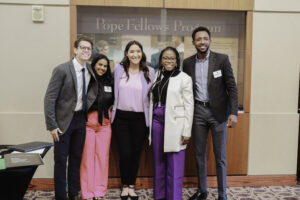 professional fields in numerous types of businesses at every level of an organization. Sometimes, it’s in a company run by an ACU alum who wants to help students at their alma mater secure employment. Other times, it’s a global brand looking for the best and the brightest employees.
professional fields in numerous types of businesses at every level of an organization. Sometimes, it’s in a company run by an ACU alum who wants to help students at their alma mater secure employment. Other times, it’s a global brand looking for the best and the brightest employees.
Whatever the case might be and whatever employers are looking for, more often than not, ACU graduates – and in particular, ACU COBA graduates – are usually at the head of the line when it comes to new hires each summer.
So it shouldn’t be surprising that more than 50 companies from across the state and Oklahoma were represented on Thursday, Oct. 5, for the first joint Career Fair sponsored by COBA and the Department of Engineering and Physics at the Hunter Welcome Center. COBA also has in-house career preparation led by Professional Development and Internship Director Jasmine McCabe-Gossett. Students also have access to the ACU Virtual Career Center with resources to help them create resumes and cover letters.
McCabe-Gossett (2010), who joined COBA last year, sensed a need for a Career Fair. After months of preparation, on October 5, that happened giving COBA students a chance to sit across from potential employers, put their resumes in front of them, and allow them to talk about themselves and what skills they would bring to an organization.
 Various companies with both a local and international presence participated in the fair, providing our students with options that appealed to all. Business and technology students were able to engage with companies within the following industries: real estate, hospitality, IT services, consulting, distribution, financial services, sales, healthcare and more. One student noted, “I have never attended a career fair, but it was great! It was so cool to be able to see many different options in internships, companies, and people!”
Various companies with both a local and international presence participated in the fair, providing our students with options that appealed to all. Business and technology students were able to engage with companies within the following industries: real estate, hospitality, IT services, consulting, distribution, financial services, sales, healthcare and more. One student noted, “I have never attended a career fair, but it was great! It was so cool to be able to see many different options in internships, companies, and people!”
These companies weren’t just looking for full-time employees, either. Internships have become a way for companies to put a student and potential future employee through an on-the-job interview, a point McCabe-Gossett tried to drive home to some of her students going into the Career Fair.
“We want to connect students with employers, especially students looking for full-time employment,” she said. “But a considerable focus is to connect employers to potential interns. In the lead-up to the event, we hosted several different workshops to help students feel comfortable and confident, starting with a workshop focused on identifying personal values and what it looks like to live out your faith in the workplace authentically. We had a panel of professionals who came in and spoke about that.
“The Career Fair turned out to be geared more toward internships,” McCabe-Gossett said. “During this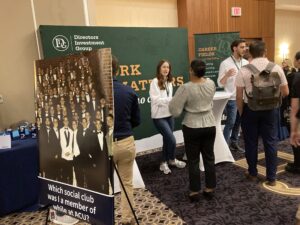 season, many companies are laying off employees, but we know it’s still strategically important to build a pipeline, and internships are a big part. I told the students not to dismiss the internship experience because it’s a great foundation\opportunity that can open doors for them. Some students were disappointed, but I tried to help re-frame their thinking regarding how you leverage an internship.”
season, many companies are laying off employees, but we know it’s still strategically important to build a pipeline, and internships are a big part. I told the students not to dismiss the internship experience because it’s a great foundation\opportunity that can open doors for them. Some students were disappointed, but I tried to help re-frame their thinking regarding how you leverage an internship.”
Another area where McCabe-Gossett and others helping her with the Career fair tried to re-form thinking centered around the experiences students might have working as interns or part-time workers at faith-based camps or events. While that experience fits neatly into the ACU experience, sometimes it doesn’t catch the eye of a potential employer, something McCabe-Gossett said she tried to help some students with as they prepare themselves to hit the job market.
“A lot of times, our students have faith-based experiences, so we talked about how to translate those experiences to a compelling resume and what values they can bring to the workplace,” she said. “Those are wonderful experiences, but we also want our students to be able to go toe-to-toe with anyone for any job. This is beyond talking about what you did but digging into how you did your job and the result.”
And this year’s success has McCabe-Gossett already thinking about the 2024 Career Fair.
 “We’ve had Meet the Firm Nights in the past, which was specific to accounting majors, and that’s wonderful,” she said. “But I wanted to cast a wider net this year and probably a wider one next year. It was a heavy lift, but I’m glad we did it because I now have this Career Fair to show potential employers. We have ACU alumni who are killing it in the business world, and they’re in positions of power, so why not ask them to come back here and represent their companies? I’m trying to create a playbook to present to alumni who work at Google or AT&T or wherever to help convince them they should come back here and represent their company at future events.”
“We’ve had Meet the Firm Nights in the past, which was specific to accounting majors, and that’s wonderful,” she said. “But I wanted to cast a wider net this year and probably a wider one next year. It was a heavy lift, but I’m glad we did it because I now have this Career Fair to show potential employers. We have ACU alumni who are killing it in the business world, and they’re in positions of power, so why not ask them to come back here and represent their companies? I’m trying to create a playbook to present to alumni who work at Google or AT&T or wherever to help convince them they should come back here and represent their company at future events.”
For more information on professional development in COBA, email Jasmine McCabe-Gossett at jcj05c@acu.edu.
by M. C. Jennings | Oct 19, 2023 | Academics, Careers In..., COBA Faculty, COBA Staff, College Decisions, Computer Science, Current Students, Faith Infusion, School of Information Technology and Computing, Student Spotlights
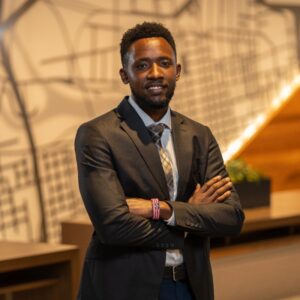 written by special contributor Lance Fleming
written by special contributor Lance Fleming
Fabrice Mpozenzi spent his summer internship working for JP Morgan Chase in Wilmington, Delaware, where he had the opportunity to get in on the ground floor of working on the front end and back end of web applications and other projects meant to further his understanding of the business.
The junior computer science major from Rwanda also worked on a business with a team of interns, which was eventually presented to senior executives for implementation. Mpozenzi’s internship fueled his desire to work as a software engineer after he graduates from ACU.
We recently caught up with Mpozenzi to get his insights on his summer internship and how ACU prepared him to work with JP Morgan Chase.
Q: What did you do in your internship?
Mpozenzi: “I had a chance to work on several different projects. I worked on a web application’s front and back end and presented it to a team of engineers, including my manager. I also had an opportunity to collaborate with other interns to work on a business plan project that we presented to senior executives.”
Q: What was your favorite part of the internship?
Mpozenzi: “What I loved most about my internship was the opportunity to shadow other teams to see the projects they were working on and learn from them. I also loved networking with different people at the company.”
Q: What are the most significant lessons you learned in your internship?
Mpozenzi: “The internship taught me two things: learning is a journey that never ends because there’s always going to be something new to learn, and one must stay hungry and motivated to learn new skills. I also learned that asking questions, especially in the workplace, is an art that unlocks knowledge and fosters a deeper understanding.”
Q: How do you see this experience aiding you in the future?
Mpozenzi: “It’s given me a roadmap to an industry that I would like to contribute to in the future, and I made connections with people from diverse backgrounds that I believe are going to be helpful in my future endeavors.”
Q: What are your plans after graduation?
Mpozenzi: “I plan to work with a Fintech company as a software engineer.”
Q: Do you have any tips for future interns or students looking for internships?
Mpozenzi: “I would tell students looking for internships to stay proactive and seek support from the professional development team. Also, stay informed about your industry, and once you secure an internship, make the most of the experience by learning and networking.”
Q: How has your time at ACU prepared you for this internship, employment, or graduate school after graduation?
Mpozenzi: “The academic coursework at ACU has equipped me with a solid foundation of knowledge and problem-solving skills relevant to my field. ACU’s professional development services, including resume workshops and interview coaching, have also helped me refine my professional presentation. These resources have prepared me for this internship and laid the groundwork for my post-graduation plans.”
Q: What’s been your most memorable experience as a business or technology student at ACU?
Mpozenzi: “My favorite thing about being a technology student at ACU is the supportive faculty and the vibrant student community that has created an environment where I can collaborate and engage in meaningful discussions with peers. ACU’s commitment to fostering a strong community has enriched my academic experience.”
by M. C. Jennings | Oct 10, 2023 | Academics, Careers In..., COBA Faculty, College Decisions, Current Students, Marketing, Outcomes, Professional Development, Student Spotlights, Student Spotlights, Uncategorized
Written by special contributor, Lance Fleming
When most people go to Arkansas in the summer, it’s to take advantage of some of the great outdoor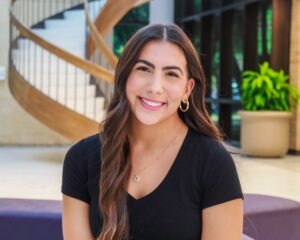 activities offered by “The Natural State,” such as fishing, kayaking and canoeing, exploring lakes and rivers, hiking, mountain biking, and visiting national parks and nature centers for which the state is known.
activities offered by “The Natural State,” such as fishing, kayaking and canoeing, exploring lakes and rivers, hiking, mountain biking, and visiting national parks and nature centers for which the state is known.
But Bryanna Monteiro spent her summer as an intern for the state’s most visible business: Walmart. Instead of spending her days outside enjoying what Arkansas offers, she was working inside on networking and connectivity. Her work paid off, however, as the senior marketing major from Orlando, Florida, earned an offer and accepted a job with Walmart that will begin after she graduates from ACU.
We recently caught up with Monteiro to get a sense of her internship and how ACU prepared her for her work in the summer and beyond.
Q: What did you do in your internship?
Monteiro: “I was a merchandising intern in Department 72: Networking and Connectivity. I was given a project over the summer: content quality score acceleration within our department. At the end of the internship, I presented the project to leadership, where I talked about my strategy for what items to remove, move, and improve.”
Q: What was your favorite part of the internship?
Monteiro: “All the valuable experience it gave me because of all the incredible people I met, from other interns to people who work internally at Walmart and external people Walmart works with. I feel like I learned so much from getting to hear others’ experiences as well as the wisdom they were able to share with me.”
Q: What are the most significant lessons you learned in your internship?
Monteiro: “The importance of progress over perfection and focusing on opportunities and growth rather than just the challenges that may arise with things out of your control. There is always more to do, and moving forward even when things don’t go to plan is essential.”
Q: How do you see this experience aiding you in the future?
Monteiro: “This was truly the most incredible experience because I learned to be confident in my abilities and skills without being afraid to share my input. I met so many amazing people who supported me but also challenged and pushed me so that I would grow both personally and professionally.”
Q: Is this job leading to full-time employment with Walmart? If not, what are your plans after graduation?
Monteiro: “Yes, it is! I will be moving to Bentonville, Arkansas, post-graduation.”
Q: Do you have any tips for future interns or students looking for internships?
Monteiro: “Do an internship!! I cannot stress this enough. I don’t believe there is such a thing as looking back and regretting not having done more internships. Be yourself and know what you’re passionate about/what you are good at so you can find the right fit for you. Connect with your professors and anyone you meet; that will be important when looking for opportunities. Finally, ensure you intern at a company you see yourself working at or are open to because it could lead to future opportunities, and you won’t waste your time.”
Q: How has your time at ACU prepared you for this internship, employment, or graduate school after graduation?
Monteiro: “My time at ACU prepared me for this internship/future post-graduation job because I am an individual rather than just a number at this school. My professors have supported and encouraged me in every aspect: in class and when I was preparing to take on this internship. All my courses have equipped me with the skills necessary to succeed in my role. ACU provided me with all the additional resources I could use when preparing.”
Q: What’s been your most memorable experience as a business student at ACU?
Monteiro: “The application side of every class I have taken because it allowed me to take what I am learning and use it in scenarios I may encounter later. I love COBA’s community aspect in that all the professors want you to succeed and are the biggest support system in helping you achieve your goals.”
by M. C. Jennings | Oct 3, 2023 | Academics, COBA Faculty, COBA Staff, College Decisions, Current Students, Management, Professional Development, Student Spotlights, Uncategorized
Written by special contributor, Lance Fleming
While millions worldwide spent part of their summer vacation enjoying the ocean and sea air while taking a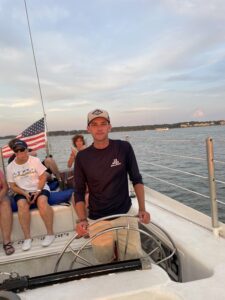 cruise, ACU junior business management major Dan Hastings spent his summer making sure some of those people had the time of their lives.
cruise, ACU junior business management major Dan Hastings spent his summer making sure some of those people had the time of their lives.
Hastings worked as an intern for Vagabond Cruise Lines during the summer and spent it based in Hilton Head, South Carolina, one of the busiest vacation spots in the country. We recently caught up with Hastings, a native of Westborough, Massachusetts, and got a rundown of his summer spent with Vagabond Cruise.
Q: What did you do in your internship?
Hastings: I worked with 12 other interns, serving guests daily through different roles. The main functions were food and beverage, reservations/back office, and on-the-boat work. Some days, I would work on the sailboat taking out trips, talking to guests, raising the sails, and other duties that needed to be performed on that boat, but the next day, I might work in the office handling reservations. The variety of this internship is what made every day new and exciting.
Q: What was your favorite part of the internship?
Hastings: My favorite part of the internship was living on the island and being on the water daily. I love the ocean, and the opportunity to spend my summer on it was incredible.
Q: What are the most significant lessons you learned in your internship?
Hastings: One of the biggest lessons I learned is that it’s OK to make mistakes as long as you learn and grow from them. I also learned a lot about teamwork and how crucial it is to have a cohesive team that you can rely on to achieve the organization’s goals.
Q: How do you see this experience aiding you in the future?
Hastings: Hospitality is my passion. I love serving others, and this internship was a way for me to practice and perfect how to have good interactions with guests and clients. That experience is what I’ll hold with me going into the future.
Q: Do you have any tips for future interns or students looking for internships?
Hastings: Don’t be afraid to try something new, even if you know little about it. I traveled across the country to a place I had never been to move in with people I had never met, and it turned into an incredible, unforgettable summer.
Q: How has your time at ACU prepared you for this internship and future employment?
Hastings: ACU has taught me so much about interacting with people professionally and casually. I’ve learned that through close relationships with friends and professors in the very welcoming ACU community. What an ACU student brings to the table is an attitude of gratitude and willingness to work hard, even if the work is exhausting or not what you enjoy.
Q: What’s been your most memorable experience as a business or technology student at ACU?
Hastings: The COBA faculty! They genuinely want what’s best for you and go out of their way to foster student success daily.
COBA seeks to develop connected, inspired, and equipped business and technology professionals who honor God and bless the world through:
-
- Distinctive programs
- Lifelong relationships
- Pathways for impact
To learn more about the College of Business at ACU, click here.
by M. C. Jennings | Sep 25, 2023 | Academics, Careers In..., COBA Faculty, COBA Staff, College Decisions, Current Students, Financial Management, Professional Development, Uncategorized
Written by special contributor, Lance Fleming
It probably doesn’t happen often that an intern working at an insurance company during the summer calls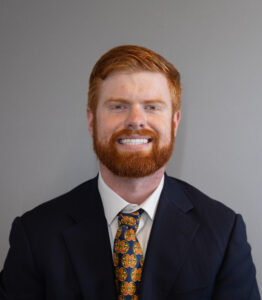 the best part of that internship the chance to improve his communication skills. But for ACU senior finance major Will Fargason, that was his favorite part of working during the summer for S-S Bendure Hartwig, one of the fastest-growing firms representing American Income Life branch of Globe Life Insurance.
the best part of that internship the chance to improve his communication skills. But for ACU senior finance major Will Fargason, that was his favorite part of working during the summer for S-S Bendure Hartwig, one of the fastest-growing firms representing American Income Life branch of Globe Life Insurance.
Based in Columbus, Ohio, S-S Bendure Hartwig has been one of the top workplaces in Columbus from 2013-21, as selected by Columbus CEO magazine. Fargason spent the summer working remotely, meaning most client interactions came via Zoom meetings. Not exactly the best way to communicate, but for Fargason, it helped him work on his interpersonal skills.
We recently caught up with the native of Lubbock to get some insights on his summer spent working as an insurance agent for S-S Bendure Hartwig.
Q: What was your favorite part of the internship?
Fargason: Being able to speak with the clients daily through Zoom calls. We communicated and tried to figure out the best possible plans for those people to be able to live their lives and not worry if they were to pass away, how their kids’ lives would be affected.
Q: What are the most significant lessons you learned in your internship?
Fargason: The greatest lesson I learned was not taking anything for granted. The conversations I had with clients and learning about their financial or physical situations reminded me how blessed I was to be in a position where I had a fantastic internship opportunity and could help other families find what was best suited for their needs at that time.
Q: How do you see this experience aiding you in the future?
Fargason: This experience will significantly help me in the future because, throughout this internship, I exponentially increased my communication skills. Talking to clients daily and through complex topics has helped my vocabulary and ability to catch different vocal cues to ensure I communicate as effectively as possible.
Q: Do you have any tips for future interns or students looking for internships?
Fargason: Apply for every internship that seems remotely interesting. I never knew exactly what I wanted to do, and being able to do an internship allowed me to see if this field was something I enjoyed and wanted to continue.
Q: How has your time at ACU prepared you for this internship and for future employment?
Fargason: My time at ACU has helped me through the various preparation applications they have provided me and throughout my classes, learning everything I would need to help me in the business world. Being taught by professors with their doctorates and at the highest level of education has been an enormous blessing for me to be prepped for life and work after college.
Q: What’s been your most memorable experience as a business student at ACU?
Fargason: The opportunity to grow professionally while still in school. The business school has many opportunities to meet high-class business people and learn everything you want about life after college. This opportunity to learn from people who have been successful in their fields and have chosen to come back to campus to share what worked for them and how we could be successful is something I’ve enjoyed.
COBA seeks to develop connected, inspired, and equipped business and technology professionals who honor God and bless the world through:
-
- Distinctive programs
- Lifelong relationships
- Pathways for impact
To learn more about the College of Business at ACU, click here.
by M. C. Jennings | May 26, 2023 | COBA Faculty, College Decisions, Current Students, School of Information Technology and Computing, Student Spotlights, Uncategorized
Written by special contributor Lance Fleming
Each day, students across the ACU campus display the university’s mission to educate students for Christian service and leadership throughout the world through their actions and acts of service on the campus. Each year, students like those are nominated by their academic departments. From those nominations, 50 scholars are selected by the ACU Faculty Senate to receive the University Scholars Award for their graduating class.
Among those 50 scholars who demonstrated outstanding scholarship by maintaining a grade point average (GPA) of 3.5 or higher, earning 90 hours towards their degree, and continuing the pursuit of knowledge in their research field, seven are students from the College of Business Administration. The COBA students who received this year’s University Scholars Award are Kathryn Crawford, Gracie Isham, Matthew Roberson, Will Harris, Diego Lozano Welsh, Ben Blackmon, and Garrett Powell.
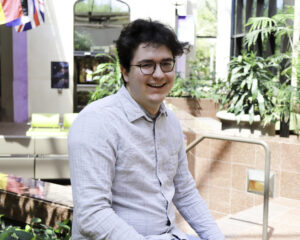 We have been highlighting each of those seven individuals over the last few weeks, including this profile of Ben Blackmon. A native of Allen, Texas, Ben recently graduated from ACU with a degree in Digital Entertainment Technology (DET) and a minor in Bible. He will be attending Guildhall SMU in the fall, a graduate program designed for video game development where he will be part of the level design track.
We have been highlighting each of those seven individuals over the last few weeks, including this profile of Ben Blackmon. A native of Allen, Texas, Ben recently graduated from ACU with a degree in Digital Entertainment Technology (DET) and a minor in Bible. He will be attending Guildhall SMU in the fall, a graduate program designed for video game development where he will be part of the level design track.
Ben has also been involved with SIGCHI, the leading organization for students and professionals interested in studying human-computer interaction. He also led the DET club this year as president.
Ben recently answered a few questions about his time at ACU and in COBA, covering everything from his most influential class to the most impactful experience he’s had while at ACU:
Q: What is the most important thing you’ve learned about yourself at ACU?
Blackmon: “The most important thing I’ve learned at ACU is that life isn’t about me. When you stop and consider the lives of everyone around you and how they are all experiencing life alongside you, it helps put things into perspective in a way that I hadn’t had previously. Even though I entered college knowing that life isn’t about me, it wasn’t until I grew up and matured that my life started to reflect that belief.”
Q: What professor or class has impacted you most and why?
Blackmon: “I think of all of the Professors that have impacted me, the most impactful has been Professor Rich Tanner. He was an excellent mentor and teacher, but he was a good friend when things became tough this semester. He has consistently been there for his students and has been there for us throughout all of our time here.”
Q: Of all the things you’ve experienced at ACU, what do you believe will have the most impact on your life?
Blackmon: “The most influential part of being a part of COBA is the staff. I know all of the SITC staff with whom I have had classes personally, and they have helped me grow tremendously. Even beyond that, for the one class I had with Dr. Andy Little for BLAW, he helped me when I struggled in his class. I have never been surrounded by a staff that has been so supportive, helpful, and instrumental to my growth at ACU.”
by M. C. Jennings | May 26, 2023 | Academics, Athletics, COBA Faculty, COBA Staff, Current Students, Faith Infusion, Management, Student Spotlights, Student Spotlights
Written by special contributor Lance Fleming
Each day, students across the ACU campus display the university’s mission to educate students for Christian service and leadership throughout the world through their actions and acts of service on the campus. Each year, students like those are nominated by their academic departments. From those nominations, 50 scholars are selected by the ACU Faculty Senate to receive the University Scholars Award for their graduating class.
Among those 50 scholars who demonstrated outstanding scholarship by maintaining a grade point average (GPA) of 3.5 or higher, earning 90 hours towards their degree, and continuing the pursuit of knowledge in their research field, seven are students from the College of Business Administration. The COBA students who received this year’s University Scholars Award are Kathryn Crawford, Gracie Isham, Matthew Roberson, Will Harris, Diego Lozano Welsh, Ben Blackmon, and Garrett Powell.
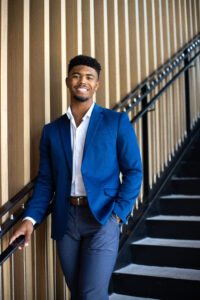 We have been highlighting each of those seven individuals over the last few weeks, including this profile of Will Harris. A native of Houston, Texas, and a business management major, Will carries a 3.78 GPA while competing on the ACU track and field team. Aside from his work on the track, Will is already a licensed realtor, having earned his real estate license two years ago. Will has been selling properties for two years, and his post-graduation plan is to continue selling real estate with the goal of becoming one of the top-producing tenant representatives in Houston.
We have been highlighting each of those seven individuals over the last few weeks, including this profile of Will Harris. A native of Houston, Texas, and a business management major, Will carries a 3.78 GPA while competing on the ACU track and field team. Aside from his work on the track, Will is already a licensed realtor, having earned his real estate license two years ago. Will has been selling properties for two years, and his post-graduation plan is to continue selling real estate with the goal of becoming one of the top-producing tenant representatives in Houston.
Will also wants to open a center for financial literacy, entrepreneurship, and professional development in an underrepresented area of Houston. Will competes in the long jump, triple jump, and 100 meters as part of ACU’s tradition-rich track and field program and is also a member of Lynay and the president of the College Entrepreneurs Organizations (CEO). He’s also a part of the Student-Athlete Advisory Committee, Nu Kappa Psi, and is a DEI mentor.
Will recently answered a few questions about his time at ACU and in COBA, covering everything from his most influential class to the most unique thing he’s been a part of while at ACU:
Q: What is the most important thing you’ve learned about yourself at ACU?
Harris: “The most important thing I have learned at ACU is how to step into a leadership role even when you feel unprepared. The only way to grow is to become uncomfortable for a period of time.”
Q: What professor or class has impacted you most and why?
Harris: “Dr. Dennis Marquardt and Dr. Matt Deeg had the most significant impact on me because they have taken so much time outside the classroom to invest in me as a young man of God. Both men set the standard for integrity in and out of the classroom, and while their classes taught me a lot about business, the value I gained from being in their presence was more rewarding.”
Q: What has been your experience in COBA?
Harris: “My favorite COBA experience was, by far, Leadership Summit 2023. The Lord did something to my heart on that mountaintop, and I honestly was not the same person when I returned to school. I learned to trust the Lord and surrender my life to Him in a way I didn’t know was possible.”
Q: Of all the things you’ve experienced at ACU, what do you believe will have the most impact on your life?
Harris: “ACU Track and Field gave me a family I will never lose. For four years, I learned what it meant to fight hard towards a shared goal with a team! The way the coaches and team mentored me and grew me as a Christian man is the one thing that impacted me the most during my time at ACU.”
by M. C. Jennings | May 19, 2023 | Academics, Alumni Spotlight, COBA Faculty, COBA Staff, College Decisions, Current Students, Faith Infusion, Human Resource Management, Management, Outcomes, Student Spotlights, Student Spotlights
Written by special contributor Lance Fleming
Each day, students across the ACU campus display the university’s mission to educate students for Christian service and leadership throughout the world through their actions and acts of service on the campus. Each year, students like those are nominated by their academic departments. From those nominations, 50 scholars are selected by the ACU Faculty Senate to receive the University Scholars Award for their graduating class.
Among those 50 scholars who demonstrated outstanding scholarship by maintaining a grade point average (GPA) of 3.5 or higher, earning 90 hours towards their degree, and continuing the pursuit of knowledge in their research field, seven are students from the College of Business Administration. The COBA students who received this year’s University Scholars Award are Kathryn Crawford, Gracie Isham, Matthew Roberson, Will Harris, Diego Lozano Welsh, Ben Blackmon, and Garrett Powell.
We have been highlighting each of those seven individuals over the last few weeks, including this profile of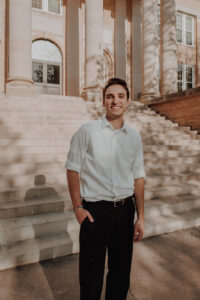 Diego Lozano Welsh. A native of Coppell, Texas, Diego recently graduated with a 3.87 GPA as a business management major. In June, he will begin work as a Talent Acquisition Specialist for Sinacola, a construction company in Frisco, Texas.
Diego Lozano Welsh. A native of Coppell, Texas, Diego recently graduated with a 3.87 GPA as a business management major. In June, he will begin work as a Talent Acquisition Specialist for Sinacola, a construction company in Frisco, Texas.
As a student, Diego – a member of Frater Sodalis – was instrumental in reviving the Lighthouse Catholic Student Organization, which was hit hard by COVID in 2020 and almost disappeared. But with the help of sponsors and parishes in Abilene, Diego led the effort to bring the organization back to campus. He was also part of Lynay, and as a freshman, he began doing volunteer work with “Palm House Kids,” a group that provides children from lower-income families a meal and a place to play and teaches them about Jesus.
Diego recently answered a few questions about his time at ACU and in COBA, covering everything from his most influential class to the most unique thing he’s been a part of while at ACU:
Q: What is the most important thing you’ve learned about yourself at ACU?
Welsh: “The most important thing I’ve learned about myself is that I have been equipped to spread the gospel. I learned how to involve my faith in everything that I do. This allows me to show my hope in Christ and bring that hope to others.”
Q: What professor or class has impacted you most and why?
Welsh: “Dr. Matt Deeg greatly impacted my development during college. I was lucky enough to have a class with him for three consecutive semesters. During those semesters, I changed my major and concentration a few times. He walked with me each time, having conversations to help lead me in the right direction. He was a fantastic teacher whom I learned a lot from professionally. However, the most significant impact he had in my life was personally, as a mentor and a friend.”
Q: What has been your experience in COBA?
Welsh: “I have loved every moment in COBA. I got to work as a COBA student ambassador during my senior year, giving tours to high school students and working in the offices for recruitment. That allowed me to have a different perspective on COBA. I saw the faculty and staff every day and experienced the culture in COBA. This was such a fantastic opportunity; it allowed me to build relationships with everyone working there and see them as real people: these relationships and all the experiences I had in COBA combined into a beautiful experience at ACU.”
Q: Of all the things you’ve experienced at ACU, what do you believe will have the most impact on your life?
Welsh: “The relationships I built will be the most impactful. The way that I learned to build relationships with mentors and the friendships I developed will shape how I live the rest of my life.”
by M. C. Jennings | May 9, 2023 | Academics, Accounting, Current Students, Faith Infusion, MAcc, Research, Student Spotlights, Uncategorized
Written by special contributor Lance Fleming
Each day, students across the ACU campus display the university’s mission to educate students for Christian service and leadership throughout the world through their actions and acts of service on the campus. Each year, students like those are nominated by their academic departments. From those nominations, 50 scholars are selected by the ACU Faculty Senate to receive the University Scholars Award for their graduating class.
Among those 50 scholars who demonstrated outstanding scholarship by maintaining a grade point average (GPA) of 3.5 or higher, earning 90 hours towards their degree, and continuing the pursuit of knowledge in their research field, seven are students from the College of Business Administration. The COBA students who received this year’s University Scholars Award are Kathryn Crawford, Gracie Isham, Matthew Roberson, Will Harris, Diego Lozano Welsh, Ben Blackmon, and Garrett Powell.
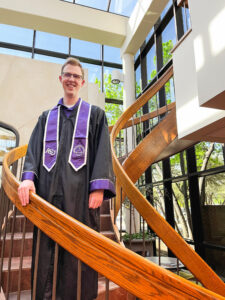 We will highlight each of the seven over the next month, including this profile of Matthew Roberson, a native of Weatherford who carries a 4.0 GPA and is graduating with a degree in accounting. After graduation, Matthew plans to complete his Master of Accountancy with ACU and continue his audit internship with Condley and Company.
We will highlight each of the seven over the next month, including this profile of Matthew Roberson, a native of Weatherford who carries a 4.0 GPA and is graduating with a degree in accounting. After graduation, Matthew plans to complete his Master of Accountancy with ACU and continue his audit internship with Condley and Company.
Matthew has served as Vice President of Fundraising for ACU’s chapter of the International Justice Mission and was also a member of the Alpha Chi National College Honor Society and the Beta Gamma Sigma Honor Society.
Matthew recently answered a few questions about his time at ACU and in COBA, covering everything from his most influential class to the most unique thing he’s been a part of while at ACU:
Q: What is the most important thing you’ve learned about yourself at ACU?
Roberson: “I’ve learned that I value relationships more than academic or work success. Investing time to know the people I am around provides me with the most fulfillment.”
Q: What professor or class has impacted you most and why?
Roberson: “This one is tough to answer. Each professor I have had at COBA has profoundly impacted my life, and I cannot honestly rank who has done so the most. However, the class that most influenced the trajectory of my life was Financial Accounting 210 with Dr. Clint Buck. Before taking that class, I struggled with finding purpose and fulfillment in my previous major. While Dr. Buck provided a logical foundation for accounting principles that I still rely on to this day, the most important thing he did was help me understand why and how accountants bring good into our communities. All I needed was the ‘why’ and the ‘what’ followed soon after.”
Q: What has been your experience in COBA?
Roberson: “My experience in COBA has been unparalleled. I transferred to ACU in the second half of my junior year, and I fully expected COBA to be like the other academic environments I had experienced. However, I was happily proved wrong. There is a familial atmosphere at COBA that I was hard-pressed to find elsewhere. The professors pushed me to be the best I could be, but I never once felt like I had to go it alone.”
Q: Of all the things you’ve experienced at ACU, what do you believe will have the most impact on your life?
Roberson: “The connections I have formed at ACU will impact my life the most.”
by M. C. Jennings | May 5, 2023 | Academics, COBA Faculty, Current Students, Faith Infusion, Financial Management, Management, Outcomes, Research, Social Entrepreneurship, Student Spotlights, Uncategorized
Written by special contributor Lance Fleming
Each day, students across the ACU campus display the university’s mission to educate students for Christian service and leadership throughout the world through their actions and acts of service on the campus. Each year, students like those are nominated by their academic departments. From those nominations, 50 scholars are selected by the ACU Faculty Senate to receive the University Scholars Award for their graduating class.
Among those 50 scholars who demonstrated outstanding scholarship by maintaining a grade point average (GPA) of 3.5 or higher, earning 90 hours towards their degree, and continuing the pursuit of knowledge in their research field, seven are students from the College of Business Administration. The COBA students who received this year’s University Scholars Award are Kathryn Crawford, Gracie Isham, Matthew Roberson, Will Harris, Diego Lozano Welsh, Ben Blackmon, and Garrett Powell.
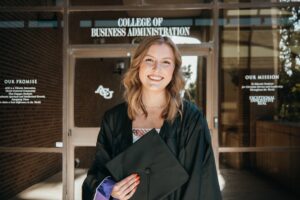 We will highlight each of the seven over the next month, including this profile of Kathryn Crawford. A native of Flower Mound, Texas, Kathryn carries a 4.0 GPA and is graduating with a BBA degree double majoring in Financial Management and Management with a concentration in Leadership. After graduation, she will travel this summer and serve as a Resident Advisor for the Leipzig Study Abroad program.
We will highlight each of the seven over the next month, including this profile of Kathryn Crawford. A native of Flower Mound, Texas, Kathryn carries a 4.0 GPA and is graduating with a BBA degree double majoring in Financial Management and Management with a concentration in Leadership. After graduation, she will travel this summer and serve as a Resident Advisor for the Leipzig Study Abroad program.
Kathryn is a member of Sigma Theta Chi and participated in Sing Song with her club each of the last two years. As a freshman, she was in Sing Song and directed a Freshman Follies Hall act. She also volunteered at Palm House as a freshman and sophomore and worked in the Lytle Center for Faith and Learning.
Kathryn recently answered a few questions about her time at ACU and in COBA, covering everything from her most influential class to the most unique thing she’s been a part of while at ACU:
Q: What is the most important thing you’ve learned about yourself at ACU?
Crawford: “I grow the most when I am challenged. Even though it can be difficult, pushing myself out of my comfort zone has been pivotal to my development personally, academically, and spiritually.”
Q: What professor or class has impacted you most and why?
Crawford: “The class that impacted me most at ACU was International Business. I had the opportunity to take this course abroad during my junior year when I spent a semester in Leipzig, Germany. I not only learned how countries engage with one another, but I was also able to experience first-hand how businesses operate outside the United States. Touring companies such as BMW and Leipziger Messe allowed me to gain a new perspective on the possible operations and organizational structures of businesses in a way that would not have been possible in a traditional classroom setting. I came to appreciate cultural collaboration and international business through this course and plan to pursue this area more in my future career.”
Q: What has been your experience in COBA?
Crawford: “For someone who didn’t know exactly what she wanted to do entering college, I could not have ended up in a better place to explore my passions and cultivate my skills than COBA. Surrounded by encouraging faculty, I uncovered new areas of interest each year. The support I experienced from a few specific professors, such as Dr. Jody Jones, helped me find my affinity for research and ignited a desire to continue my education beyond a bachelor’s degree. With unique courses such as social enterprise consulting and S.T.A.R., I immersed myself in real-life situations that forced me to apply classroom concepts to actual projects. Most importantly, I will walk away most grateful for the integration of faith into every single aspect of my experience from my time at ACU. Between equipping courses like Leadership Summit and the consistent spiritual encouragement from my professors, particularly Dr. Marquardt, I was exposed to an incredibly unique experience. I leave ACU well-rounded and equipped to enter life as a young professional with confidence only possible from the strong foundation in knowledge, faith, and purpose that COBA cultivated.”
Q: Of all the things you’ve experienced at ACU, what do you believe will have the most impact on your life?
Crawford: “My semester abroad will have the most impact on my life. This experience gave me a new perspective on the world around me and my role in it. I came to appreciate living outside my normal, everyday comforts and continually found myself enamored by the cultural nuances surrounding me everywhere I traveled. It solidified my ability to love and appreciate my neighbors regardless of their customs, traditions, or beliefs. I hope that I never stop seeing the world with the awe and wonder I felt during this time, and I pray that God will use that for his glory wherever life leads me.”
 professional fields in numerous types of businesses at every level of an organization. Sometimes, it’s in a company run by an ACU alum who wants to help students at their alma mater secure employment. Other times, it’s a global brand looking for the best and the brightest employees.
professional fields in numerous types of businesses at every level of an organization. Sometimes, it’s in a company run by an ACU alum who wants to help students at their alma mater secure employment. Other times, it’s a global brand looking for the best and the brightest employees.  Various companies with both a local and international presence participated in the fair, providing our students with options that appealed to all. Business and technology students were able to engage with companies within the following industries: real estate, hospitality, IT services, consulting, distribution, financial services, sales, healthcare and more. One student noted, “I have never attended a career fair, but it was great! It was so cool to be able to see many different options in internships, companies, and people!”
Various companies with both a local and international presence participated in the fair, providing our students with options that appealed to all. Business and technology students were able to engage with companies within the following industries: real estate, hospitality, IT services, consulting, distribution, financial services, sales, healthcare and more. One student noted, “I have never attended a career fair, but it was great! It was so cool to be able to see many different options in internships, companies, and people!” season, many companies are laying off employees, but we know it’s still strategically important to build a pipeline, and internships are a big part. I told the students not to dismiss the internship experience because it’s a great foundation\opportunity that can open doors for them. Some students were disappointed, but I tried to help re-frame their thinking regarding how you leverage an internship.”
season, many companies are laying off employees, but we know it’s still strategically important to build a pipeline, and internships are a big part. I told the students not to dismiss the internship experience because it’s a great foundation\opportunity that can open doors for them. Some students were disappointed, but I tried to help re-frame their thinking regarding how you leverage an internship.” “We’ve had Meet the Firm Nights in the past, which was specific to accounting majors, and that’s wonderful,” she said. “But I wanted to cast a wider net this year and probably a wider one next year. It was a heavy lift, but I’m glad we did it because I now have this Career Fair to show potential employers. We have ACU alumni who are killing it in the business world, and they’re in positions of power, so why not ask them to come back here and represent their companies? I’m trying to create a playbook to present to alumni who work at Google or AT&T or wherever to help convince them they should come back here and represent their company at future events.”
“We’ve had Meet the Firm Nights in the past, which was specific to accounting majors, and that’s wonderful,” she said. “But I wanted to cast a wider net this year and probably a wider one next year. It was a heavy lift, but I’m glad we did it because I now have this Career Fair to show potential employers. We have ACU alumni who are killing it in the business world, and they’re in positions of power, so why not ask them to come back here and represent their companies? I’m trying to create a playbook to present to alumni who work at Google or AT&T or wherever to help convince them they should come back here and represent their company at future events.” written by special contributor Lance Fleming
written by special contributor Lance Fleming activities offered by “The Natural State,” such as fishing, kayaking and canoeing, exploring lakes and rivers, hiking, mountain biking, and visiting national parks and nature centers for which the state is known.
activities offered by “The Natural State,” such as fishing, kayaking and canoeing, exploring lakes and rivers, hiking, mountain biking, and visiting national parks and nature centers for which the state is known. cruise, ACU junior business management major Dan Hastings spent his summer making sure some of those people had the time of their lives.
cruise, ACU junior business management major Dan Hastings spent his summer making sure some of those people had the time of their lives. the best part of that internship the chance to improve his communication skills. But for ACU senior finance major Will Fargason, that was his favorite part of working during the summer for S-S Bendure Hartwig, one of the fastest-growing firms representing American Income Life branch of Globe Life Insurance.
the best part of that internship the chance to improve his communication skills. But for ACU senior finance major Will Fargason, that was his favorite part of working during the summer for S-S Bendure Hartwig, one of the fastest-growing firms representing American Income Life branch of Globe Life Insurance. We have been highlighting each of those seven individuals over the last few weeks, including this profile of Ben Blackmon. A native of Allen, Texas, Ben recently graduated from ACU with a degree in Digital Entertainment Technology (DET) and a minor in Bible. He will be attending Guildhall SMU in the fall, a graduate program designed for video game development where he will be part of the level design track.
We have been highlighting each of those seven individuals over the last few weeks, including this profile of Ben Blackmon. A native of Allen, Texas, Ben recently graduated from ACU with a degree in Digital Entertainment Technology (DET) and a minor in Bible. He will be attending Guildhall SMU in the fall, a graduate program designed for video game development where he will be part of the level design track. We have been highlighting each of those seven individuals over the last few weeks, including this profile of Will Harris. A native of Houston, Texas, and a business management major, Will carries a 3.78 GPA while competing on the ACU track and field team. Aside from his work on the track, Will is already a licensed realtor, having earned his real estate license two years ago. Will has been selling properties for two years, and his post-graduation plan is to continue selling real estate with the goal of becoming one of the top-producing tenant representatives in Houston.
We have been highlighting each of those seven individuals over the last few weeks, including this profile of Will Harris. A native of Houston, Texas, and a business management major, Will carries a 3.78 GPA while competing on the ACU track and field team. Aside from his work on the track, Will is already a licensed realtor, having earned his real estate license two years ago. Will has been selling properties for two years, and his post-graduation plan is to continue selling real estate with the goal of becoming one of the top-producing tenant representatives in Houston. Diego Lozano Welsh. A native of Coppell, Texas, Diego recently graduated with a 3.87 GPA as a business management major. In June, he will begin work as a Talent Acquisition Specialist for Sinacola, a construction company in Frisco, Texas.
Diego Lozano Welsh. A native of Coppell, Texas, Diego recently graduated with a 3.87 GPA as a business management major. In June, he will begin work as a Talent Acquisition Specialist for Sinacola, a construction company in Frisco, Texas. We will highlight each of the seven over the next month, including this profile of Matthew Roberson, a native of Weatherford who carries a 4.0 GPA and is graduating with a degree in accounting. After graduation, Matthew plans to complete his Master of Accountancy with ACU and continue his audit internship with Condley and Company.
We will highlight each of the seven over the next month, including this profile of Matthew Roberson, a native of Weatherford who carries a 4.0 GPA and is graduating with a degree in accounting. After graduation, Matthew plans to complete his Master of Accountancy with ACU and continue his audit internship with Condley and Company. We will highlight each of the seven over the next month, including this profile of Kathryn Crawford. A native of Flower Mound, Texas, Kathryn carries a 4.0 GPA and is graduating with a BBA degree double majoring in Financial Management and Management with a concentration in Leadership. After graduation, she will travel this summer and serve as a Resident Advisor for the Leipzig Study Abroad program.
We will highlight each of the seven over the next month, including this profile of Kathryn Crawford. A native of Flower Mound, Texas, Kathryn carries a 4.0 GPA and is graduating with a BBA degree double majoring in Financial Management and Management with a concentration in Leadership. After graduation, she will travel this summer and serve as a Resident Advisor for the Leipzig Study Abroad program.